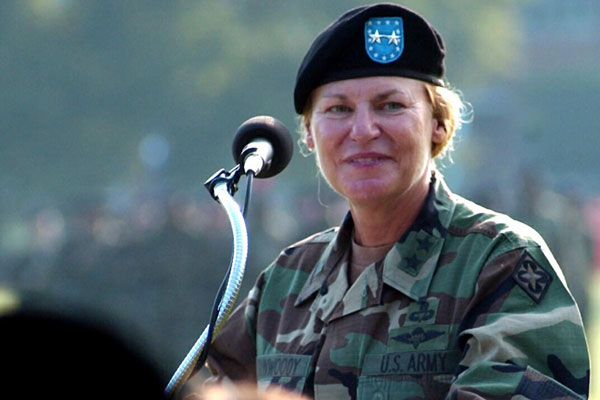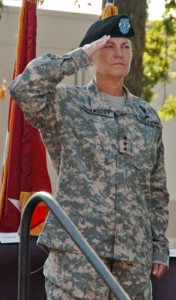Moving Up the Ranks
When Defense Secretary Robert M. Gates announced this week that President George W. Bush had nominated the U.S. military’s first woman four-star general, he
Jul 31, 2020279 Shares279.3K Views
Lt. Gen. Ann Dunwoody (AP)
When Defense Secretary Robert M. Gates announced this week that President George W. Bush had nominated the U.S. military’s first woman four-star general, he was happy to tout the significance. “Women continue to achieve great success and make invaluable contributions to the defense of this nation,” Gates said. “This is an historic occasion for the Dept. of Defense.”
But Lt. Gen. Ann Dunwoody, the woman who made that history, seemed to downplay the feminist moment. “This nomination only reaffirms what I have known to be true about the military throughout my career,” she said in a statement released by the Pentagon, “… that the doors continue to open for men and women in uniform.”
Dunwoody and other successful women in the military tread carefully when it comes to talking about their place in what is still a strongly masculine institution. They are determined to see their accomplishments measured against all their peers — male and female — and usually resist anything that might be regarded as special consideration. But despite that determination to fit in, Dunwoody brings an unusual perspective to her work.
“I’m a very positive person,” Dunwoody told me in an interview just over a year ago. “I focus on all the goodness going on.” That doesn’t mean avoiding tough challenges, she explained, but rather, not loosing track of the good things that are happening. But are there a lot of other generals who focus on “all the goodness?” “That might not be the first thing out of their mouths,” she conceded with a laugh.
Dunwoody, when talking about whether men and woman lead differently, brought up a 2004 analysis of four Army divisions that had just returned from tours in Iraq. It found that most leaders had strong technical and tactical skills, but what set the best leaders apart was their interpersonal skills. The study identified what it called the “Big 12”—a set of behaviors exhibited by the officers best able to achieve operational excellence and motivate good soldiers to remain in the Army. At the top of the list: keeps cool under pressure; clearly explains missions, standards and priorities; sees the big picture, provides context and perspective.
Those are the kinds of traits that many place on the female side of the ledger. Though Dunwoody said she didn’t see it that way, “but maybe that’s because I’ve been in a green suit for so long.” She didn’t offer it as proof that women are set to zoom up the chain of command. But, rather, it suggests that if there is a “softer,” female way of doing things, that approach is increasingly valued in the military as it modernizes and also struggles to hold on to its workforce.
Following tradition, Dunwoody isn’t likely to say much until the Senate confirms her appointment as chief of Army Materiel Command, responsible for supplying the Army with all its equipment. But in the interview – conducted for a Wilson Quarterly storyon women military officers – she gave plenty of clues about just what kind of four-star general she would be.
Dunwoody didn’t hesitate when asked about her own leadership style, shooting back with her Myers-Briggs personality assessment. She’s an ENFP (extraversion, intuition, feeling, perceiving), which the testing people describe as “Warmly enthusiastic and imaginative. See life as full of possibilities….Spontaneous and flexible, often rely on their ability to improvise and their verbal fluency.” Again, is that a common military type? “I would guess that only 1 percent of the Army” fits that description, she said.
“I am a people person,” Dunwoody said, adding that she likes to lead by walking around, asking soldiers, “How is that chow in the mess hall? How are the barracks?”
The fourth generation of her family to serve in the military, Dunwoody was commissioned as an officer in 1975, about the time the Women’s Army Corps was being disbanded and women were integrated into the rest of the Army. Today, women make up about 15 percent of enlisted personnel in the U.S. military, and a slightly larger portion of the officer corps, including 57 women who are three-star generals and admirals.
Dunwoody, then deputy chief of staff of the Army, described a fundamental change in the U.S. military that has scrambled long-standing rules that bar women from most combat jobs. “Before, it was a linear battlefield,” she said. “In the rear was kind of a safe haven. That is no more –- it is a blurred battlefield out there.”
Many analysts expect the experience in the Iraq war, where those blurred lines have brought many female soldiers into combat situations, to prompt a thorough review of the rules that govern what jobs women can have. “Everything is always open for study,” Dunwoody said.
She talked about the meritocracy of the military (“I truly believe that the Army promotes based on past performance and demonstrated future potential.”) while praising its commitment to diversity. She said women are helping to change the force — not because of their gender, but because they are part of a concerted effort to transform the military into a more modern, agile organization.
When she takes over a new job, Dunwoody says she likes to talk about her leadership philosophy, and about herself. For the first five years of her marriage, her husband, Craig Brotchie, was in the Air Force. This often prompted difficult decisions about what jobs to take, and where to live — even if it meant being apart. “I loved the Army, he loved the Air Force — and we loved each other,” she said. Dunwoody doesn’t have children. “Not because I didn’t want them,” she said. “But do I think I could have done this with children? I don’t know.”
Still, she says she tells her troops, “At the end of the Army, all you have is family. So don’t lose it along the way.” Dunwoody also likes to give an upfront warning about her pet peeves: bad language, overweight soldiers and people who can’t meet their physical fitness standards. “That takes a lot of guess work out of things,” she said.
Dunwoody insisted she’s “not the only compassionate person in the Army. I have worked for others.” But she’s never worked for a woman. “I’ve been coached and mentored by men my whole life,” she said. “I never worked for a female, they weren’t there.”
Yet Dunwoody is clearly thankful for the women who served before her. She also realizes that she is a role model for younger women, who are now seeing more women make their way to more senior jobs across the military. “It just helps everyone to know what the art of the possible is,” Dunwoody said, “and that they can continue to move up the ranks.”
**Holly Yeager is a freelance journalist. She covered the early 2008 Democratic and Republican primaries for The Washington Independent as the site’s senior national politics reporter. Before joining TWI, she was a reporter for the Financial Times. She had also covered the Pentagon for The Hearst Newspaper chain and Defense Daily. **

Hajra Shannon
Reviewer
Latest Articles
Popular Articles

